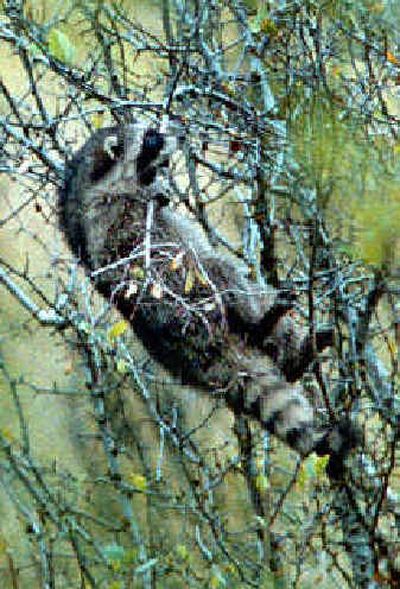Not enough traps for band of ‘bandits’

The goldfish had to go, but not via a raccoon’s digestive system. The ammonia level in Larry Zimmerman’s fish tank was rising and endangering his tropical fish. He’d started the tank with goldfish, which add elements tropical fish need in the water. But the goldfish had done their work and deserved retirement. Larry moved the five goldfish into a plastic baby bathtub on the patio of his downtown Coeur d’Alene home with every intention of building his orange friends a fancy outdoor pond with a trickling waterfall.
“I thought they’d get accustomed to the outdoors while I dug the pond,” Larry says.
He sculpted ledges for potted plants around a generous area he cleared for his pond. But a pond liner and pumps were more expensive than he’d figured. He left the fish in the tub, adding stones and plants, while he pondered his options.
“They were out there a few months and doing fine. I checked them every day,” Larry says.
Until last month. Larry was busy and missed two days. When he finally checked the tub, the stones had moved and the plants were scattered. He saw no fish, so he stuck his hand in the water. The fish had disappeared. Larry was speechless.
“Who would steal goldfish?” he says.
The same bandit who stole his neighbor’s goldfish a few weeks earlier. A brother in the band of bandits that roams Coeur d’Alene, Post Falls and Rathdrum. Most likely the striped gray bandit his neighbor, Bruce Anderson, had chased up his maple tree and was hoping to catch in the cage he was dragging from his garage.
“I’ve been trying to catch that raccoon for weeks,” Bruce says, gazing up with disgust into a pair of black-rimmed eyes watching his every move. The raccoon had rearranged shells Bruce had placed around the Cadillac-sized pond in his backyard, but it hadn’t reached his fish. Bruce had built his pond with steep walls and an overhanging rock ledge to discourage such bandits. He’d heard Coeur d’Alene had a raccoon problem.
“(Idaho) Fish and Game said there were so many around town,” Bruce says. “They don’t even have any traps left to borrow.”
Judy McKenna answered the phone when Bruce called Coeur d’Alene’s Fish and Game office to report the raccoon in his tree. She answers all incoming calls. Nothing Bruce told her was a surprise.
“I’ve been here since 1992, and we’ve had traps available since then,” Judy says. “It’s just gradually gotten worse. The problem is people keep feeding them.”
Fish and Game’s phone rings constantly with raccoon complaints, but the agency doesn’t trap the small animals.
“We go out on bear, deer,” Judy says.
Conservation officer Steve Agte tries to keep 15 traps on hand to lend. But he’s bought 31 in the last decade and can’t seem to hold onto them. Spring is the worst. The traps are always in use. Officers suggest people dispose of raccoons themselves. What happens after the animals are caught is between the trapper and the coon.
“We say take them out in the woods where there’s water and they can survive,” Judy says. “But raccoons can be hunted all year long because there are so many of them.”
When Fish and Game has no traps to lend, Judy offers another option: Pesky Varmints.
Dave Morelli runs the Post Falls-based nuisance wildlife trapping business. He’s a career trapper and saw potential a decade ago in catching the varmints that aggravate city folks. Raccoons and skunks were drawn by food people left for their pets outside, birdseed and fruit fallen from trees.
“I’ve gotten as many as 100 calls a year,” Dave says. But that was a few years ago. Either the problem is better, or people are handling it themselves because Dave believes his calls are slowing down.
He says town coons are fatter than their woodsy brethren, obviously suffering from the same poor eating habits as the humans they’re among. But the added weight doesn’t seem to slow them physically or mentally. They’re quick and learn to avoid tripwires.
“Usually I can snooker them,” Dave says. “There’s more to it than people think.”
Dave typically carts the coons he catches into the woods. Every year, he has to drive farther to avoid new houses. He kills coons, too, particularly sick ones or coons caught in winter when he believes killing them is kinder than starving them to death.
Fish and Game refers so many people to Dave that he doesn’t advertise anymore. And few people blanche at his $200 charge, which varies with the number of raccoons he catches.
But Diane Zimmerman, Larry’s wife, has a plan that won’t cost them a cent or any more lost fish.
“No more ponds,” she says.